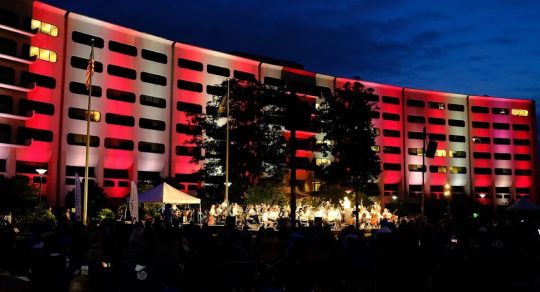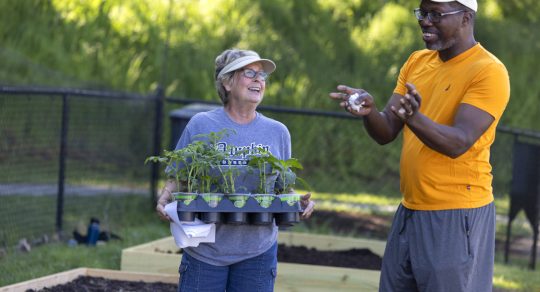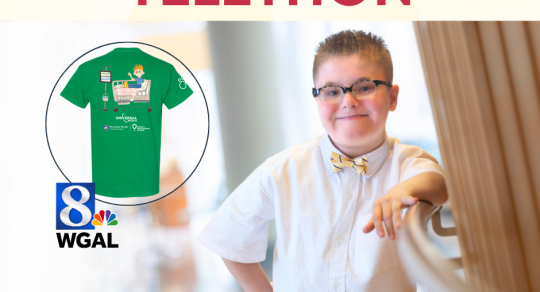Fellowship
Pediatric Rheumatology
The Pediatric Rheumatology Fellowship at Penn State Health Children's Hospital is a three-year, ACGME-accredited program that admits one fellow per year.
Explore More
The Penn State Health Children's Hospital Pediatric Rheumatology Fellowship provides trainees with the experience base and academic training needed to become successful academic rheumatologists.
Fellows in the program benefit from a collegial core curriculum shared between all pediatric fellowships, in addition to program-specific curriculum that prepares them well for the practice of evidence-based medicine and board exams.

Penn State Health's Children's Hospital Pediatric Rheumatology Fellowship
The program’s location in Hershey, adjacent to larger urban areas, provides an interesting mix of ethnicities and disease processes, from immunodeficiency-associated autoimmunity in the Amish to more conventional systemic lupus erythematosus in Hispanic and African-American patients. Fellows benefit from a variety of practice styles from a number of faculty members, all of whom trained at different academic centers. They also benefit from a close collaboration with the adult rheumatology division of the adjoining Penn State Health Milton S. Hershey Medical Center for both their first-year clinical rotation and combined academic conferences.
The program is well-supported by excellent musculoskeletal radiology, pediatric intensive care and pediatric hematology/oncology infusion services. The ready availability of anesthesia services in pediatric procedure rooms and divisional ultrasound resources facilitate management of refractory juvenile idiopathic arthritis patients. Faculty member Timothy Hahn, MD, is a USSONAR-certified ultrasonographer who aims to ensure that all incoming fellows develop a similar competence.
“My training at Penn State prepared me for diagnosing and treating a good variety of Rheumatologic conditions. It also gave me the confidence to treat new conditions such as multisystem inflammatory syndrome due to COVID-19 infection. I had a very positive experience in my fellowship, and I will always look back fondly on my time at Penn State.”
Sarah Sertial Paul, DO
Pediatric Rheumatologist Goryeb Children’s Hospital at Morristown Medical Center
Learn More about the Fellowship
Dear prospective fellow,
Thank you for your interest in our program. We serve a large geographic region with a catchment of approximately 1 million children of diverse ethnic and sociodemographic backgrounds. Our practice model has always involved several outreach clinics that you will be free to experience. We have developed a core of excellent nurse educators who will make your life as a fellow here much less hectic. Community engagement activities such as camp participation and volunteer work at Arthritis Foundation events are encouraged. We will be as interested in your quality of life as your quality of education.
Look us over, and feel free to contact me with any questions. We look forward to working with you.
Timothy Hahn, MD
Program Director
Wellness, including emotional, spiritual, social and physical health, is a crucial component to training and to becoming a professional, compassionate and resilient physician. Self-care is a skill which must be continually practiced and reinforced. Penn State College of Medicine and Penn State Health are committed to addressing wellness among residents and fellows, with multiple resources readily available.
Institutional resources
Visit BeWell - a health program designed to support Penn State Health employees
Moving to a new city with your family does not have to be stressful. Residency programs have assisted many significant others with finding employment. There is also a GME-Wide Partners in Medicine (PIM) group that offers networking opportunities as well as various social and community oriented activities.
Active and easily accessed
Graduate medical education resources
Departmental and divisional resources
Dr. Natalya Gaffney has taken on a departmental role in promoting wellness activities. As a division, pediatric rheumatology strongly encourages getting out to enjoy the natural beauty of central Pennsylvania by participating in outdoor activities. Division faculty have recreational interests ranging from competitive cycling to dance instruction, hiking and kayaking.
General Application Information
The Pediatric Rheumatology Fellowship participates in the National Residency Matching Program Pediatric Subspecialties Match, with one fellowship spot per year.
All application materials must be submitted through the Electronic Residency Application Service (ERAS) for fellowship applicants. Applicants are encouraged to complete their applications as soon as possible once ERAS opens for the season.
Eligibility
Applicants must have completed an ACGME-accredited residency in pediatrics or internal medicine/pediatrics before the fellowship starting date.
Applicants must be board-eligible or board-certified in general pediatrics by the American Board of Pediatrics.
Applicants must be eligible for or hold a Pennsylvania medical training license or medical license.
Applicants must be U.S. citizens, permanent residents or J-1 visa holders (no additional visa types are institutionally sponsored). The J-1 visa application process and fees are the applicant’s responsibility.
International medical graduates must hold a currently valid certificate from the Educational Commission for Foreign Medical Graduates.
All applications are reviewed in their entirety. There is no official limit for the number of USMLE step examination attempts or official board score “cutoffs.” However, the number of times the exam has been taken and board scores may impact the strength of an application.
All applications are considered without regard to race, religion, national origin, sex, gender, orientation, disability or family status.
Application Requirements
A complete ERAS fellowship application must contain:
Personal statement
Curriculum vitae
Letters of recommendation: At least three letters of recommendation must be included from faculty members with whom the applicant has worked. It is recommended that at least one letter be included from a pediatric rheumatologist and one from the residency program director.
Dean’s letter
Medical school transcripts
USMLE/COMLEX transcripts
For international medical graduates, ECFMG certification
Application Review
Applications will be reviewed by the internal Fellowship Application Review Committee on a rolling basis once the ERAS application is complete. Qualified applicants will be invited for an interview. It is advisable to respond to an interview application as soon as possible, as interview dates are limited and may fill quickly.
COVID-19 Update for the 2023 Interview Season
In accordance with national recommendations and in fairness to all fellowship candidates, many of whom are under travel restrictions, in-person visits and interviews will be suspended again for the 2023 interview season.
Current Fellows

PGY-6 Fellow, Pediatric Rheumatology Fellowship

PGY-5 Fellow, Pediatric Rheumatology Fellowship

PGY-4 Fellow, Pediatric Rheumatology Fellowship
Leadership


Program Coordinator, Pediatric Fellowships, Pediatrics

Program Coordinator, Pediatric Fellowships, Pediatrics
Supporting Your Training
Curriculum Details
New Fellow Boot Camp
All fellows participate in the American College of Rheumatology-sponsored Virtual Rheumatology Practicum in July and August of their first year.
Rotation Overview
Year 1
Inpatient consultations – 11 months
Staff outpatient clinics (five half-days per week) – 11 months
Fellow continuity clinic (one half-day per week) – 11 months
Adult rheumatology – four weeks
Pediatric orthopaedics – two weeks
Musculoskeletal radiology – one week
Pediatric ophthalmology – one week
Physical and occupational therapies – one week
Year 2
Scholarly and quality improvement projects – 11 months
Fellow continuity clinic – 11 months
Year 3
Scholarly and quality improvement projects – 11 months
Fellow continuity clinic – 11 months
Electives
AMPS program (Children's Hospital of Philadelphia)
Sports medicine for additional injection training
Cassidy Lecture Series
Frequency: Weekly (Mondays or Fridays)
To ensure a solid rheumatologic knowledge base and help prepare fellows for both in-service and eventual board exams, this series works through Cassidy’s Textbook of Pediatric Rheumatology chapter by chapter, with faculty and fellows sharing the task of lecture-style presentations.
Fellow Core Curriculum Series
Frequency: Monthly (second Monday of each month)
The Fellow Core Curriculum Series is a set of two-hour structured didactic sessions occurring monthly. This innovative learning program provides instruction ranging from a core knowledge of research methodology (including research study design, research ethics, grantsmanship, manuscript writing and basic statistical analysis) to topics such as physician wellness, CV editing and negotiating employment agreements. This is treated as protected time during which fellows are free of clinical duties.
Pediatric Grand Rounds
Frequency: Weekly (Tuesdays)
A number of pediatric grand rounds presentations are relevant to care of pediatric rheumatology patients. In addition, additional review of general pediatric topics in the first year of fellowship will prepare trainees for the General Pediatrics board exam.
Combined Medicine/Pediatrics Rheumatology Grand Rounds
Frequency: Weekly (Fridays)
This conference is a composite of topic reviews by fellows, divisional staff and outside speakers; journal article reviews by fellows and divisional staff; and musculoskeletal radiology review of recent studies.
Fellow Evidence-Based Medicine Question Review/Journal Club
Frequency: Weekly (Tuesdays)
This forum is used during the first year of fellowship to present evidence-based medicine reviews generated by clinical questions that arise in the course of clinical care. During the second and third years of fellowship, this time may also be used to review seminal and journal articles in preparation for the subspecialty board exam.
Pediatric Rheumatology Division Meetings
Frequency: Monthly (second Friday of each month)
Fellow attendance and participation in divisional meetings is encouraged. These meetings facilitate interactions with all division staff members and keep trainees abreast of divisional issues, announcements, recent practice data and fellowship program updates.
Renal Pathology Conference
Frequency: Monthly (as needed)
This conference is used for review of interim renal biopsies from systemic lupus erythematosus and necrotizing vasculitis patients.
Divisional Quality Improvement Meeting
Frequency: Monthly (fourth Friday of each month)
Dr. Catherine Bingham leads divisional quality improvement (QI) efforts that align with her leadership role in the PR-COIN network. Fellows are directly involved in division QI projects in addition to developing and completing a QI project of their own.
Virtual Learning Opportunities
The American College of Rheumatology sponsors a number of webinars highlighting both basic science and clinical research topics.
Fellows will have the opportunities to participate in OSCE-style practicums in the nationally acclaimed Penn State College of Medicine Clinical Simulation Center.
All trainees in the Pediatric Rheumatology Fellowship participate in a learning program that provides them with a core knowledge of research methodology, including study design, grantsmanship, manuscript writing and basic statistical analysis.
After identifying a research mentor in the first year, fellows design a scholarly project that may involve laboratory and/or clinical research. The second and third years are spent conducting and reporting on this project under the supervision of a Scholarship Oversight Committee. Fellows are expected to participate in data collection and statistical analysis with the goal of developing at least one manuscript for eventual publication.
Research infrastructure at Penn State Health Milton S. Hershey Medical Center includes the Pediatric Research Group, , Clinical and Translational Science Institute and laboratory facilities in the adult rheumatology division.
Fellow projects in the division thus far have included:
A translational genetic study of a patient family with combined immunodeficiency and rheumatologic disease
A prospective social media-based study examining the themes and impact of journaling in lupus patients
A translational study combining lab- and ultrasound-derived data in remitted juvenile idiopathic arthritis patients
A retrospective juvenile idiopathic arthritis database study facilitated by the Childhood Arthritis and Rheumatology Research Alliance (CARRA)
The program encourages fellows to attend the Pennsylvania Rheumatology Society meeting annually as well as national American College of Rheumatology meetings. These venues provide additional forums for fellows to present their own work, to engage with researchers from other institutions across the country for inspiration, to further their education and to initiate long-term professional relationships.
More information on the research and educational interests of each faculty member is available in Pure, the University’s researcher directory. See all division faculty here; click each faculty member’s name for details on their specific interests.
Camp JRA is a weeklong summer camp for children 8 to 18 years old with rheumatologic disease. At camp, children have the opportunity to participate in traditional summer camp activities and learn about their disease, all while getting to know other children with similar challenges. The camp is staffed by camp counselors as well as medical personnel.
Pediatric rheumatology fellows have the opportunity to attend camp, lead various educational sessions and get to know the campers during activities such as fishing, archery, rock climbing, synchronized swimming and a variety of crafts.
This is an experience that fellows look forward to each summer.
A Penn State Health pediatric rheumatology team participates annually in events that support the Arthritis Foundation, such as the annual Arthritis Walk and/or Jingle Bell Run, which are held locally at various locations.
Fellow Honors and Recognitions
The annual Resident/Fellow Research Day is held each year (with exception of during the COVID-19 pandemic) on and around the Penn State Health Milton S. Hershey Medical Center campus.
The intent of the event is to provide an opportunity for residents and fellows to showcase their research accomplishments to their peers in other clinical departments, as well as their colleagues in the basic sciences.
.
Previous presentations from the Pediatric Rheumatology Fellowship are listed here.
Honors received by trainees in the Pediatric Rheumatology Fellowship are listed here.
Contact Information
Mailing Address
Penn State Health Children’s Hospital
Pediatric Rheumatology Fellowship
Attention: Bethany Schwarz
500 University Dr.
P.O. Box 850
Mailcode H085
Hershey, PA 17033
General Contact Information
Phone: 717-531-5458
Email: bschwarz@pennstatehealth.psu.edu



